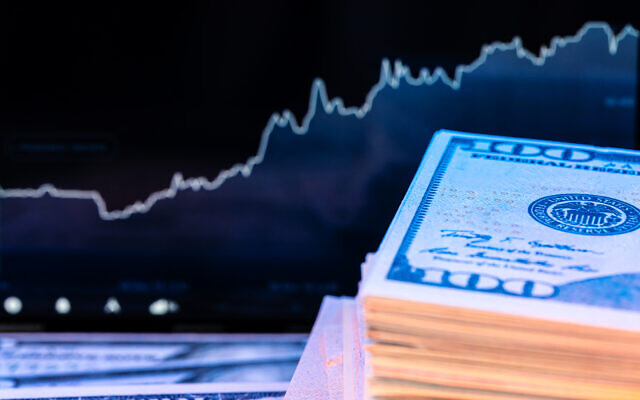Investing During a Coronavirus Pandemic
Investors and advisors share strategies to assess risk during a time of uncertainty.
After 37 years with the Atlanta Journal-Constitution and now with the AJT, , Jaffe’s focus is lifestyle, art, dining, fashion, and community events with emphasis on Jewish movers and shakers.
Some check the market indexes upon arising and throughout the day.
Nerves abound as we all know the questions: How long will this last? Will the dollar be devalued? Should I invest in Zoom, jigsaw puzzles, aviation, online education, oil?
In his shareholder letter, Larry Fink, CEO of BlackRock, stated, “Resilience is about much more than withstanding a sudden shock to markets – it also means understanding and addressing long-term structural changes. … The world will get through this crisis. The economy will recover. And for those investors who keep their eyes not on the shaky ground at our feet, but on the horizon ahead, there are tremendous opportunities to be had in today’s markets. … That is not to say the world is without risk, nor to suggest that the market has reached its bottom. It is impossible to know…”

Level-headed millennial Kenny Baer, a Certified Financial Planner with Baer Wealth Management in Marietta, has been published in Investment Advisor Magazine, NerdWallet, Ignites, FundFire, and Chattahoochee Plantation Living. He weighs in:
Jaffe: Have your clients been calling you for reassurance?
Baer: I wouldn’t say an avalanche, but certainly we are getting concerned callers. To alleviate fears, we show that volatility like we are currently experiencing was modeled in the original financial plan. We stress test the plan against current market conditions. We are also sending out weekly emails and hosting live webinars. During these times, I would rather over communicate. We are providing the prescription (information), but letting the client decide on the dosage.
Jaffe: How do you respond to alternate strategies? Metals? Betting against the market?
Baer: That is gambling, not investing. We firmly believe that capital markets will reward long term investors. I am reminded of my favorite quote by Nobel Laureate Paul Samuelson, “Investing should be more like watching paint dry or watching grass grow. If you want excitement, take $800 and go to Las Vegas.”
Metals have an extremely high volatility and low expected return; it is not something that we believe in.
Jaffe: Does it make sense to invest in companies now like cleaning products or delivery services?
Baer: It always makes sense to invest in good companies with good long-term outlook. Does it make sense to buy those companies today because you think they are in a good position to take advantage of what is happening with COVID-19?
No, all the benefit those companies expect to gain has been factored into the current price. The “market” is all-knowing, all of the information publicly available goes into the current price of the company or stock.
Jaffe: If a stock is in free fall, how do you decide when to cash out?
Baer: If you own individual stocks, the best question to ask is: “Why did I buy that stock in the first place?” If that reason is still valid at a lesser price, there is no reason to sell. Based on your situation, you should consider buying more. If you bought the stock and the reasons for your purchase have changed due to some underlying issue, then you should have already sold.
Another good quote is: “The market can remain irrational longer than you can remain solvent.” Essentially you might be the only person in the world who really knows that XYZ company should be at $100 per share. Just because you think it, doesn’t mean it will ever get there.
On the other hand, private investor Reg Regenstein, who constantly studies the markets, said several days ago, “The stock market is now very irrational, literally going down 2,000 points in one day, up 3,000 the next, then down 2000, with no apparent reason, no major breaking news to justify it.

“The best minds on Wall Street cannot predict what the market is going to do today or tomorrow, they cannot even say why it did what it did yesterday.
“I think computers using ‘algorithms’ are responsible for making these big moves, based on arcane data no one else understands. One day, Apple’s iPhone manufacturing plants and stores in China were closed because of the coronavirus, and the stock price was up over $3. It has sunk since then, but it was insane that it held up for so long, being largely dependent on China.”
Regenstein throws out a strategy for portfolio protection without selling stocks and paying a capital gains tax. “Bet some money that the market will go down. You can do this by ‘selling short’ stock indexes, that track the Dow Jones Industrial Average, the Nasdaq, and the S&P 500.
This means, theoretically, if an average declines by 10 percent and you are short, you will make 10 percent on your shorts, but you have to be nimble and ready to cover your short before the market bounces back, which it could do very rapidly.”
He continues, “Most brokerage firms are advising their clients to ride out the current plunge, and they may be right. But I suspect that they have instructed their brokers NOT to encourage people to sell, or short stocks, because this would accelerate the plunge. This may well be the buying opportunity of a lifetime.”
Regenstein poses that depressed stocks such as Apple, Home Depot, Microsoft, Disney and other great companies have been beaten down and should recover quickly after this. “Some moments I think the market is about to recover, others, I think it will reach new lows.”
Note that Regenstein is an amateur and suggests checking with financial advisors before taking action: “Just saying, there may be choices out here.”
In a March 31 Atlanta Business Chronicle, article Genesis Capital founder Jonathan Goldman mused, “We will look back on this as a 1,000-year flood.”




comments